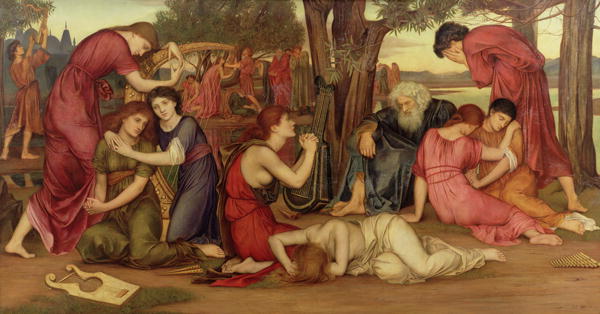Saturday, March 25 – Psalm 146
Praise the Lord!
Praise the Lord, O my soul!
2 I will praise the Lord as long as I live;
I will sing praises to my God all my life long.
3 Do not put your trust in princes,
in mortals, in whom there is no help.
4 When their breath departs, they return to the earth;
on that very day their plans perish.
5 Happy are those whose help is the God of Jacob,
whose hope is in the Lord their God,
6 who made heaven and earth,
the sea, and all that is in them;
who keeps faith forever;
7 who executes justice for the oppressed;
who gives food to the hungry.
The Lord sets the prisoners free;
8 the Lord opens the eyes of the blind.
The Lord lifts up those who are bowed down;
the Lord loves the righteous.
9 The Lord watches over the strangers;
he upholds the orphan and the widow,
but the way of the wicked he brings to ruin.
10 The Lord will reign forever,
your God, O Zion, for all generations.
Praise the Lord!
Points of Interest:
- Today we return to the jubilation we saw in Wednesday’s tour through Psalm 103. Rather than recalling the personal benefits we can experience from God, this poem invites us to reset our perspective on way things work in the world, particularly in times of injustice. God is doing more than we might first see, the psalmist says.
- First off, the poet says that people are all going to die. Even powerful people don’t accomplish most of their plans and cannot either help or threaten people as much as they claim they can. The psalmist considers this morbid thought to be good news: human power is limited in a way that divine power is not.
- While princes are making their plans and charting their wicked ways, where is God? God is feeding the hungry, releasing prisoners, helping the blind see. God is protecting immigrants and people with few rights and resources in the world. That’s where God is, and that’s what God will keep doing, the same God whose power will increase over time, never decrease.
- To the powerless, the invitation is to celebrate this God who has their back. To the powerful and the not especially powerful or powerless, there’s maybe an invitation to align our priorities with a greater and better power.
- To all of us, there seems to be a dare here to trust that God is present in human history, both when that seems evident to us and when it does not. (After all, there are orphans and widows and hungry and more in this poem. Life can be hard.) Praise is the hope-filled, joyful trust that a world full of power imbalances and hardship is still God-soaked.
Prayer for your six – Praise God for creating, loving, and helping each of your six. Bring each of them by name and face before your imagination, and tell God (however much you can believe this to be true!) that you love that God made them and is present to help them.
Spiritual Exercise – This week, after each Psalm, we’re practicing a simplified version of the Jesuit examen: examining our own life and thoughts and feelings, and connecting with God over what we find there. Today, examine three to five ways you see God as present on the earth. Choose one or more of these and praise God for God’s presence and help and goodness. When you’re done, ask God if God has anything else to reveal to you, and pause for a moment of silence while you listen.
Another way into this same exercise would be to examine three to five injustices you see on the earth, to choose one, and to ask God to show you how God is present and to be praised even in this situation.






